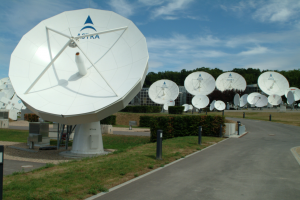
After more than 40 years of operation, DTVE is closing its doors and our website will no longer be updated daily. Thank you for all of your support.
Berenberg: SES ‘preferred’ to Eutelsat as investment
 Analysts at Berenberg have delivered a relatively positive assessment of satellite operator SES and a relatively negative view of rival Eutelsat – in line with the investment bank’s recent view of the pair’s contrasting fortunes but a reversal of its position a few years ago.
Analysts at Berenberg have delivered a relatively positive assessment of satellite operator SES and a relatively negative view of rival Eutelsat – in line with the investment bank’s recent view of the pair’s contrasting fortunes but a reversal of its position a few years ago.
Berenberg argued that SES’s shares are under-priced despite performing strongly due to factors including the receipt of the first US$1 billion of proceeds from the release of C-band spectrum in the US.
With US$3 billion of C-band proceeds still to come, the analysts said that this phase two payment, to be received late next year or early in 2024, would potentially facilitate shareholder returns, repair of the balance sheet or “disciplined investment”.
With SES in favour of industry consolidation, Berenberg considers this a risk to its share price but notes that investors responded positively to an acquisition in March than enhanced its position in government services.
SES should also benefit from the launch of nine MEO and five GEO satellites this year, it said.
Regarding Eutelsat, Berenberg noted that while its stock is “cheap”, its Q4 results and forward guidance are “unlikely to significantly impress”, particularly as new CEO Eva Berneke has warned that a “ planned return to growth in 2022/23 was no longer achievable”.
Berenberg said its caution was reinforced by Eutelsat’s exposure to Russia, unlike SES, which has little exposure to this market.
Some 6.3% of Eutelsat’s revenues come from Russia. While the operator says it is “guided by sanctions”, refusing to carry Russia Today, for example, it remains exposed to possible sanctions on its customers, risks to its ability to receive payment from Russian customers and currency exchange volatility.
Berenberg notes that the company’s “neutral” position on the Russian market has also attracted criticism.
Eutelsat’s planned launch of satellites for its OneWeb subsidiary from the Baikonur Cosmodrome was scuppered in March due to Russian demands that the UK government sell its stake in this company, further strengthening perceptions of risk.
“These moral debates and operational risks associated to Eutelsat’s investment case further strengthen our pre-existing relative preference for SES, which does not have material Russian exposure,” said Berenberg.

